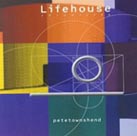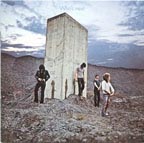Rock 'N Roll Case Study: LIFEHOUSE – The "lost" Who album
Some call it fascination others call it an obsession. One of the ongoing themes of the "Rock 'N Roll Case Study" is the study of famous unreleased albums. This essay will cover the LIFEHOUSE project by The Who, which eventually saw release in a much-modified form as WHO's NEXT in 1971.
LIFEHOUSE – The "lost" Who album
By Ronnie

Right: Cover of the LIFEHOUSE 6-CD set (released in 2000).
I. BEGINNINGS OF THE ALBUM
After the phenomenal success of their 'concept' album TOMMY in 1969, The Who and especially Pete Townsend were in a quandary about how to follow up the 'monster' that TOMMY had become. A live album was the perfect vehicle to give The Who and that's exactly what they did with the release of "Live At Leeds". In 1970, Pete explained that, "What I want to do is to attempt a follow-through and achieve something which will have as big impact as Tommy did." Pete's scope for a follow-up was grandiose indeed. Originally titled "Bobby", "Lifehouse" was a futuristic opera set in a polluted world with a totalitarian government that was redeemed by the music of The Who. It was originally envisioned to combine live performances, a movie and an album. Supposedly, Townshend was initially promised a million dollars from Universal Pictures for the project. The use of a London theater, the Young Vic, was arranged for the live performances to be filmed. Townshend had demo tapes of almost forty songs connected with the project.
But, for various reasons (that we will touch upon), the Lifehouse project never materialized. At one point Townsend was convinced to record an albums worth of material with The Who, which was released as "Who's Next" in November of 1971. The story of Lifehouse wasn’t even mentioned on the sleeve of "Who's Next" and several songs vital to the plot of Lifehouse were left off the album.

Right: Cover of the single disc LIFEHOUSE ELEMENTS (released in 2000).
II. THE CONCEPT
Rather than try to explain the plot, I have assembled a conglomeration of Pete's actual quotes over the years regarding the story of Lifehouse. Pete continued to write further drafts for Lifehouse, making further changes in the script. At one point the script was changed to a world in which rock music is banned ("Long Live Rock"). I have added some of the Lifehouse song titles in brackets -where they were either possibly intended for the film or were actually listed in Pete's notes where they would go:
"In 1971 I wrote a film script of Lifehouse for Universal Pictures. It's a sort of futuristic fantasy, a bit of science-fiction. It takes place in about twenty years, when everyone has been boarded up inside their houses and put in special garments called experience suits, through which the government feeds them programs to keep them entertained. These suits are interconnected in a universal grid, a little like the modern Internet, but combined with gas-company pipelines and cable-television-company wiring. The grid is operated by an imperious media conglomerate headed by a dictatorial figure called Jumbo who appears to be more powerful than the government that first appointed him. ["BEHIND BLUE EYES"-the main song in the film intended for the villain, Jumbo.]
Then Bobby comes along. He's an electronics wizard and takes over a disused rock theater, renames it the Lifehouse, and sets it up as an alternative to the government programs. Next he chooses a basic audience of about 300 people and prepares a chart for each of them, based on astrology and their personalities and other data; and from their charts he arrives at a sound for each of them--a single note or a series, a cycle or something electronic--anything that best expresses each individual. ["PURE AND EASY"-a focal point of Lifehouse, it was called "The Note" at the time it was recorded.] On the Lifehouse stage there is a rock group, which will be The Who, to comment on the sounds and celebrate them. But they aren't the heroes, and neither is Bobby. The idea is to make the first real superstar--the first real star who can really stand and say that he deserves the name. The star would be us all.
A self-sufficient, drop-out family group farming in a remote part of Scotland decide to return South to investigate rumours of a subversive concert event that promises to shake and wake up apathetic, fearful British society.["BABA O'RILEY"- sung by Ray at the beginning of the film as he gathers his wife Sally and his two children to begin their exodus to London.] Ray is married to Sally, they hope to link up with their daughter Mary who has run away from home to attend the concert. They travel through the scarred wasteland of middle England in a motor caravan, running an air-conditioner they hope will protect them from pollution. ["GOING MOBILE"- sung by Ray near the beginning as he and his family travel south in their hermetically-sealed van.] They listen, furtively, to old rock records which they call 'Trad'. The family arrive at the concert venue early and take part in an experiment Bobby conducts in which each participant is both blueprint and inspiration for a unique piece of music or song which will feature largely in the first event to be hacked onto the grid. ["LOVE AIN'T FOR KEEPING"- another song intended for Ray.]
What eventually happens is that the whole thing gets really big, the government decides that the concerts have to be stopped because they see it as a developing thing taking things out of their control, 'cause once people are in experience suits, they're under the government's control. The guy who happens to be in charge of the government at the time panics totally at the concert and brings his troops to try to break through the force field, but the force field lasts a given amount of time. ["Let's See Action", "Slip Kid", "Relay", "Who Are You", "Join Together"] We go in occasionally and we see the concerts going on and various people's music being played, like today it's Mary's music, and you get Mary's music and then they dance and jump about. ["Mary"] Bobby gets everybody's pieces of music together. ["Getting In Tune"] The pitch gets bigger and bigger, the force field goes down at a given moment, the troops come in and as they walk in, ["WON'T GET FOOLED AGAIN"-sung by Bobby as he denounced Jumbo's attempt to pass himself off as a spiritual seeker.] Bobby is on the platform and he gets shot by the government official and falls off the balcony-and as he hits the ground all the kids rush in to catch him and as he hits the ground they all disappear, and that was just gonna be the end of it. But the way it's written is that everybody who was taking part in the rock concert disappears but nobody else does and they're just standing there, looking, and they don't know what has happened to the people. They've gone. And that's when 'Song Is Over' starts." ["THE SONG IS OVER'- the finale to the Lifehouse movie, beginning as Bobby and the crowd vanish and continuing through the end credits.]

Right: WHO'S NEXT - the album that LIFEHOUSE became.
III. WHAT HAPPENED
The problems with Lifehouse started when The Who filmed the Lifehouse concert scenes at the Old Vic. Unfortunately, the shows were basically an experiment in artist-audience feedback in which they audience didn't respond. They wanted to hear the old Who songs. The second setback for the project was the fact that the money promised by Universal never materialized.
Again, I'll refer to Townsend’s own words to explain what happened:
"I've worked myself on something which you'll never see to the point of nervous breakdown. We've worked probably harder in the last year than we ever have. But in this particular case it went on and on and after about six months with no product, only problems, and only me involved in it and the rest of the group gettin' bored, John gettin' involved in makin' his own album, Roger ringing me up every day trying to dissuade me from doing the project, saying what we really need to do is to work on the road, we eventually gave up, and to put it quite frankly we just went back into the old mold. We went into the studio. I picked out a few numbers I'd had for the film project - 'Pure and Easy,' 'Baba O'Riley,' 'Gettin' In Tune,' 'Won't Get Fooled Again,' 'Love Ain't For Keepin,' and 'Behind Blue Eyes.' We did a very straight album."
The resulting album was "Who's Next", and in an ironic twist of fate the failure of the Lifehouse project made Who's Next a greater album than it could have been as simply Lifehouse's soundtrack. Enough material was recorded for a two-record set but the band decided to release a single album. Townshend explained:
"We were gonna do a whole thing, Then we figured it would be far better to just pick the best stuff out and make it a good, hard, rock-solid album 'cause we were afraid of doing what the Beatles did, just laying ourselves wide open like they did with their double album and making it so that there was too much, too many unlinked ideas which to the public would look like untogetherness, despite the fact that it's always there in the background."
Over the years, Townshend never really let go of Lifehouse. As songs from Smile did for The Beach Boys, bits of the abandoned project surfaced through the years, on subsequent Who albums.
- Some of the Lifehouse songs ended up on Pete's first solo album, "Who Came First", including "Let’s See Action" and "Pure and Easy".
- "Pure and Easy" also found a home on 1974's "Odds and Sods" album.
- "Slip Kid" ended up on 1975's "The Who By Numbers" album.
- "Music Must Change", "New Song", "Sister Disco" and "Who Are You" were on 1978's "Who Are You" album.
IV. FINALLY...THE RELEASE OF LIFEHOUSE...KIND OF
After almost thirty years, Pete Townshend was finally able to bring some conclusion to the Lifehouse project with the release of the LIFEHOUSE CHRONICLES in February of 2000. The set consists of 6 discs including demos, the 1999 radio play and various remixes.
The Lifehouse Chronicles can be purchased exclusively through Pete’s official merchandise site www.eelpie.com. It is ironic that Pete is using the internet to market his box set since Peter predicted the advent of the internet in LIFEHOUSE (see the description of the script above). Unlike Al Gore's grandiose claims of "inventing" the internet, Pete Townsend's claims are actually based in reality!
Since the 6-CD set might be a little overwhelming for the casual music fan, a condensed version called LIFEHOUSE ELEMENTS is also available and can be found in most music stores.
You might ask, "will we ever see a film version of LIFEHOUSE"? I don't know, but our patience was rewarded when it came to the music of LIFEHOUSE - it only took 30 years. Now, if we could only convince Brian Wilson to release a similar 6 CD set called THE SMILE CHRONICLES! Just in time for the 40th anniversary of Smile in 2007...
Credits and Sources:
Much of the material for this article came from two Pete Townshend-related web sites, www.petetownshend.com and www.eelpie.com If you want further information on Lifehouse, these sites are a virtual plethora of information (and will keep you busy for hours, reading wise!!).
I also found some great quotes from Pete about Lifehouse in the 1979 book, "HEADLINER'S THE WHO" by John Swenson
(copyright 1979).
|


